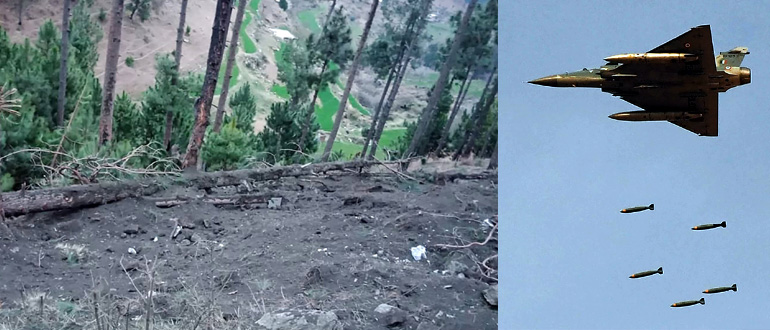New Delhi:India has carried out aerial bombing over the disputed ceasefire line in Kashmir for the first time since it went to war with Pakistan in 1971, claiming to have hit a large militant training camp.
The Indian foreign secretary, Vijay Gokhale, said in a briefing that Delhi had received credible intelligence the Jaish-e-Mohammed (JeM) militant group, which killed 40 Indian security personnel in a suicide bombing earlier this month, was training fighters for similar attacks.
“In the face of imminent danger a pre-emptive strike became absolutely necessary,” Gokhale said.
Pakistan, which was the first to announce the incursion of Indian fighter jets early on Tuesday morning, has said the war planes only made it up to four miles inside its territory before they were rebuffed, dropping their payloads without casualties or damage.
“Indian aircrafts intruded from Muzaffarabad sector,” Pakistan’s armed forces spokesman, Maj-Gen Asif Ghafoor said on Twitter on Tuesday morning.
“Facing timely and effective response from Pakistan Air Force released payload in haste while escaping which fell near Balakot,” he said.
He added in a later tweet: “Under forced hasty withdrawal aircrafts released payload which had free fall in open area. No infrastructure got hit, no casualties.”
The attacks overnight followed nearly a fortnight of sabre-rattling between the nuclear-armed neighbours over the 14 February suicide bombing, in which India has claimed Pakistan had a “direct hand”. JeM is based in Pakistan but Islamabad has rejected any responsibility for the attack.
Gokhale said Indian jets struck JeM’s largest training camp in the Balakot area in the early hours of Tuesday. “A very large number of JeM terrorists, trainers, senior commanders and groups of jihadis being trained for fidayeen [suicide] action were eliminated,” he said.
He said the training facility, which he described as being in thick forest on a hilltop, was far away from any civilian settlements, and was overseen by the brother-in-law of the JeM chief, Masood Azhar.
He declined to confirm the location of Balakot, which is the name of both a Kashmiri village on the ceasefire line between India and Pakistan and a larger city about 50 miles from that border.
An attack on the larger Balakot would be significant because it is the province of Khyber-Pakhtunkhwa, well into accepted Pakistani territory.
Pakistan’s prime minister, Imran Khan, summoned an emergency meeting of top security and diplomatic officials, the country’s foreign minister, Shah Mahmood Qureshi, said on Tuesday.
“I consider this a violation of the line of control,” Qureshi said in brief comments to the media. “Pakistan has the right to an appropriate response, it has the right to self defence.”
Pakistan released pictures on social media showing uprooted trees and cratered soil, which it claimed was the extent of the damage from the Indian bombing.
The conflicting narratives over the attack echo the September 2016 “surgical strikes”, in which India claimed to have sent special forces to destroy militant facilities over the ceasefire border – an attack that Pakistan still maintains never happened.
The varying positions allowed India to trumpet its reprisal against Pakistan without forcing Islamabad to respond in a way that might spiral into a larger conflict.
Indian ministers were celebrating the airstrikes on Tuesday morning. “It was an act of extreme valour,” said Prakash Javadekar, the human resources development minister, in the first official acknowledgement of the operation on Tuesday.
Another minister, Vijay Kumar Singh, posted a picture on Twitter of an eagle with a snake in its talons. “They say they want to bleed India with a 1,000 cuts,” he wrote. “We say that each time you attack us, be certain we will get back at you, harder and stronger.”
Though Pakistan downplayed the attacks, Khan, whose successful election campaign last year featured strident promises to stand up to India, could still face popular pressure to respond.
“Strategically, it is a disaster for Pakistan that India can keep doing this,” said Mosharraf Zaidi, a political analyst and columnist, referring to both Tuesday’s attack and the September 2016 strikes.
“What does it say about Pakistan’s red lines that countries like India can keep violating our airspace or claim they have carried out surgical strikes?”
Sherry Rahman, a Pakistani senator and former ambassador the US, said the attack was aimed at Modi’s re-election when India starts voting in about two months’ time. “India is giving its own people a message with these strikes; this is for their electorate, the domestic voters,” Rahman said.
Indian news agency Asian News International quoted Indian air force sources claiming 12 Mirage fighter jets had struck “a major terrorist camp” over the border with 1,000 kg of explosives. The attack took place around 3.30am, the agency claimed.
While exchanges of artillery and light weapons over the line are very common, intentional incursions by aircraft have not been publicly acknowledged since the two countries fought a war in 1971.
Military planes could be heard over Srinagar, the capital of Indian-controlled Kashmir, in the early hours of Tuesday morning. There has been a large troop buildup in the region in recent days and doctors have been advised to cancel leave and stockpile medicines.
More than 300 separatist activists have been detained in past days, fuelling rumors that the Indian government was preparing to respond to the Pakistanis.
Hours after the attack on Tuesday morning, officers from the National Investigation Agency raided the Srinagar homes of veteran separatist leaders Yasin Malik, who was among those detained at the weekend, and Mirwaiz Umar Farooq.(THE GUARDIAN)



